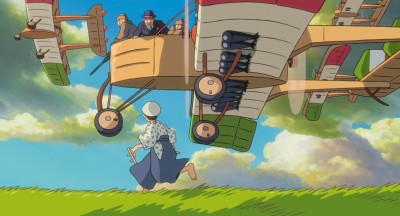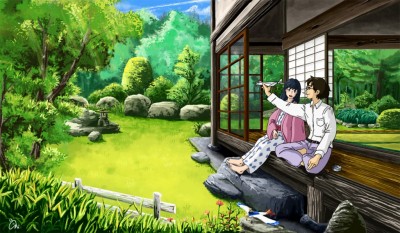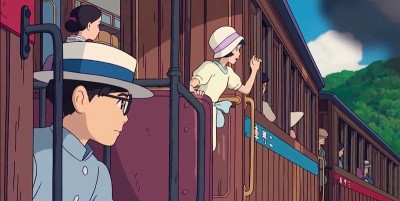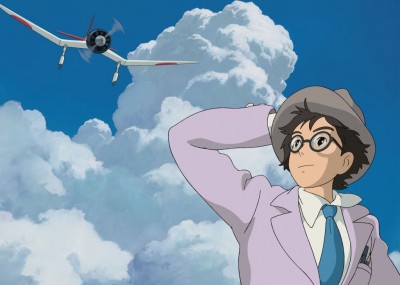
I should note from the onset that I am reviewing The Wind Rises from having seen the film in Japanese with subtitles. How much difference the English-language dub will make to the film, I don’t know. I should also say that this is not a children’s film. I don’t think there’s anything in it that children shouldn’t see, but it is a long film and is essentially an animated biopic. Apart from the fantasy sequences, it is apt to be of little interest to younger children. Finally, viewers should be fully aware that The Wind Rises is a film about the man who designed the Zero, the Japanese fighter plane that was used against the Allies in WWII. Quite a few people — including some critics — have been upset over this, and even more have been troubled over the fact that the character, Jirô Horikoshi (voiced by Joseph Gordon-Levitt in the English version), expresses little regret over the use of his creation. (It remains to be seen how the dialogue may have been modified for U.S. consumption.)

All that to one side, The Wind Rises is a frequently remarkable film — easily the best animated film of 2013 and fully of deserving its Oscar Nomination. (My guess is the Oscar will go to the less controversial, Frozen.) This is supposedly the last film that Japanese animation master Hayao Miyazaki will make, and while it will never win the following of his earlier works like My Neighbor Totoro (1988), Spirited Away (2001) or Howl’s Moving Castle (2004), it is, in many ways, Miyazaki’s most ambitious film. It’s not just that the decades-spanning (and rather loose) life story gives the film a complex dramatic arc. More to the point is that Miyazaki has anchored himself to a basically realistic story. He only allows himself the dream sequences, during which Jirô encounters a visionary Italian airplane designer, Caproni (voiced by Stanley Tucci in the English version), to break into the fantasticated world we expect from him. (The sequences reminded me a good bit of the recurring dream in Satoshi Kon’s 2006 film Paprika.) In this regard, Miyazaki has set himself very specific limitations — or has he?

It’s easy to oversell the realism aspect of The Wind Rises. Yes, it is nominally realistic, but it’s very much a movie kind of realism. Reality in this case isn’t exactly real. Jirô‘s dream of flight — with its often fanciful designs — is only sort of connected to reality. As in most Miyazaki, there’s a kind of simple fascination with the mechanics (in a kind of Rube Goldberg manner) of how things work — almost to the point of abstraction. A great deal of the film is given over to Jirô‘s romance with the TB-stricken Nahako (voiced by Emily Blunt in the English version). If the TB aspect doesn’t clue you in to the fact that this is almost 19th-century Romanticism, the rest of the epic nature of this doomed love will make it clear. It’s filled with love at first sight, near miss encounters and surprise meetings. And it’s all played out against a background of events — from an earthquake to gathering war clouds — that would make old Hollywood romances proud. If you’ve a romantic bone in your body, it’s irresistible.

The more prickly aspects of the film are going to be a deal-breaker for some. That’s inevitable, no matter how much Miyazaki tries to downplay the purpose Jirô‘s planes will eventually serve. While the focus is on his dreams of flight, the nature of war planes is there. (And Jirô is clearly aware of this, since one of the concerns is the added weight of the weapons.) The film addresses this, but it isn’t going to be enough for everyone. Whether it will be enough for you is your call, but the film is really about the pursuit of dreams — whether creative or romantic — and that is its bottom line. Rated PG-13 for some disturbing images and smoking.
Playing at Flatrock Cinema.




and even more have been troubled over the fact that the character, Jir
Oh, there you are. I thought you had deserted us. (I even had an idea why, but I can’t remember it now.)
I don’t recall much about violent consequences, but there is a bit about aftermath — only that seems to have as much to do with loss of his planes as anything. Bear in mind, I’m not bothered by the film personally. I think it’s a fine — and as you say generous — work. My biggest qualm is its length.
That’s unfortunate– I’d have been interested to hear your theory. If you thought maybe it had to with me joining the circus to follow my life-long dream of becoming a lion-tamer, well… that wouldn’t have even been close. I don’t even have the right hat.
Closer to the mark is the fact that, oddly, my web-browser doesn’t like the Xpress movie page as of late, requiring me to switch from firefox to explorer to view it. Even so, I’m still reading/lurking every week… just haven’t chimed in.
As for AFS, I’ve been saddled with an obligation on Tuesdays nights, preventing my attendance. With luck, I’ll shake it one of these weeks not too long from now.
By the by, did you ever end up seeing Winter’s Tale? Really wish that snow hadn’t kept you from warning me against it.
Oh and yes, The Wind Rises felt long. Most of his movies creep near or beyond the 120 minute mark, but I don’t remember feeling put out by it in the case of his more recent titles as much as I started to here. Castle in the Sky felt like it ran about three hours, though. And if pressed I’d say Totoro is my pure favorite of the lot, and I see now that it ran only 86 minutes. Might be something to that.
No, I always thought you were more likely to be the guy who trained those dancing bears that wear tutus.
I am, by the way, informed that changes are coming to the MX website. What that means exactly remains a mystery.
In all honesty, I think I admire Miyazaki more than I like him. I’ve never liked any of his films nearly so well as those of Satoshi Kon (the three that I’ve seen).
“and even more have been troubled over the fact that the character, Jir
“Oh and yes, The Wind Rises felt long.”
So it was long winded, sorry i couldn’t resist.
I only regret I didn’t think of it.
Leaves the Fine Arts on Friday, but is being picked up by Flat Rock Cinema.